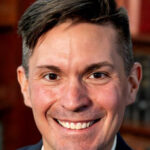Karl Rahner Consultation 2025: “One Baptism”
The theme of the 79th Annual Convention of the Catholic Theological Society of America at the Portland Marriott Waterfront Hotel from June 12-15, 2025 is “One Baptism: Evolving Visions of Catholicity from Nicaea to Vatican II and Beyond.” The Karl Rahner Consultation, which takes place within the CTSA Convention on June 13, will focus on the oneness of Baptism and its consequences of the being of the baptized.
Andrew Barrette (Professor of the Practice, Boston College) will present “Understanding Foundations: Remarks on the Relation of Rahner’s Early Reading of Maréchal and his later Christology.” The paper will have two parts. The first will show that the philosophy of the Belgian Jesuit, Joseph Maréchal, was a spur to Rahner’s thought. It enabled Rahner to confront the critical philosophy of Immanuel Kant from the standpoint of traditional Aristotelean-Thomist philosophy. Rahner transposed Kant’s “transcendental deduction,” which formulates the conditions of the possibility of any understanding at all, into metaphysics. This transposition serves to raise our awareness, Barrette proposes, that human understanding never has all of being once and for all. It does, however, “intend” all of being, understood as both proportionate and absolutely transcendent to humanity’s natural capacity.
In the second part of the paper, Barrette proposes to apply Rahner’s insights to the concrete unity of human being in the Mystical Body of Christ. This is a reality not exhausted in abstract propositions, he will argue, but rather is intended by human understanding. Barrette’s overall thesis is that Rahner helps us understand mystery, not from a lack but rather from a superabundance of intelligibility in which subjects participate.
Youngpa Kwon (Senior Researcher, Sogang Institute for Theology, Seoul) will present a paper, “Bridging Bei-sich-sein and Prehension: Toward a Metaphysical Theology of Evolution.” She will start from two premises: “Contemporary evolutionary theory claims to be a meta-metaphysical framework” and “theology is increasingly called upon to offer a deeper spiritual understanding that engages with evolutionary phenomena.” Dr. Youngpa aims to connect Rahner’s epistemology with evolutionary theory. Her starting point is Rahner’s Spirit in the World. There Rahner discussed “Being and Knowing as Original Unity in Being-Present-to-Self” or Bei-sich-sein. Rahner’s discussion can be found on p. 68 of the Dych translation (Part One, Chapter Two, Section III). Rahner emphasized the “factual unity of being and knowing.”
Rahner’s Bei-sich-sein is related, Dr. Youngpa proposes, to the thought of Alfred North Whitehead. In Process and Reality, Whitehead discussed the concept of “Prehension.” Sentient beings “prehend” (grasp or take account of) their environment as they respond to it. By coordinating Bei-sich-sein and Prehension, Dr. Youngpa intends to integrate metaphysics and epistemology. The integration, she will argue, helps to explain “how all beings, through self-determination and creative decisions, relate to God.” As a contribution to Catholic theology, her study will challenge what she calls materialistic understandings of evolution. It will also affirm, in a qualified way, both divine immutability and the role of God as savior in history.
Michael Rubbelke (St. John’s University, Collegeville) will serve as Respondent. Madeleine Jarrette (Ph.D. Candidate, Boston College) will be the Moderator.
To read titles of previously published “Rahner Papers” click here.

